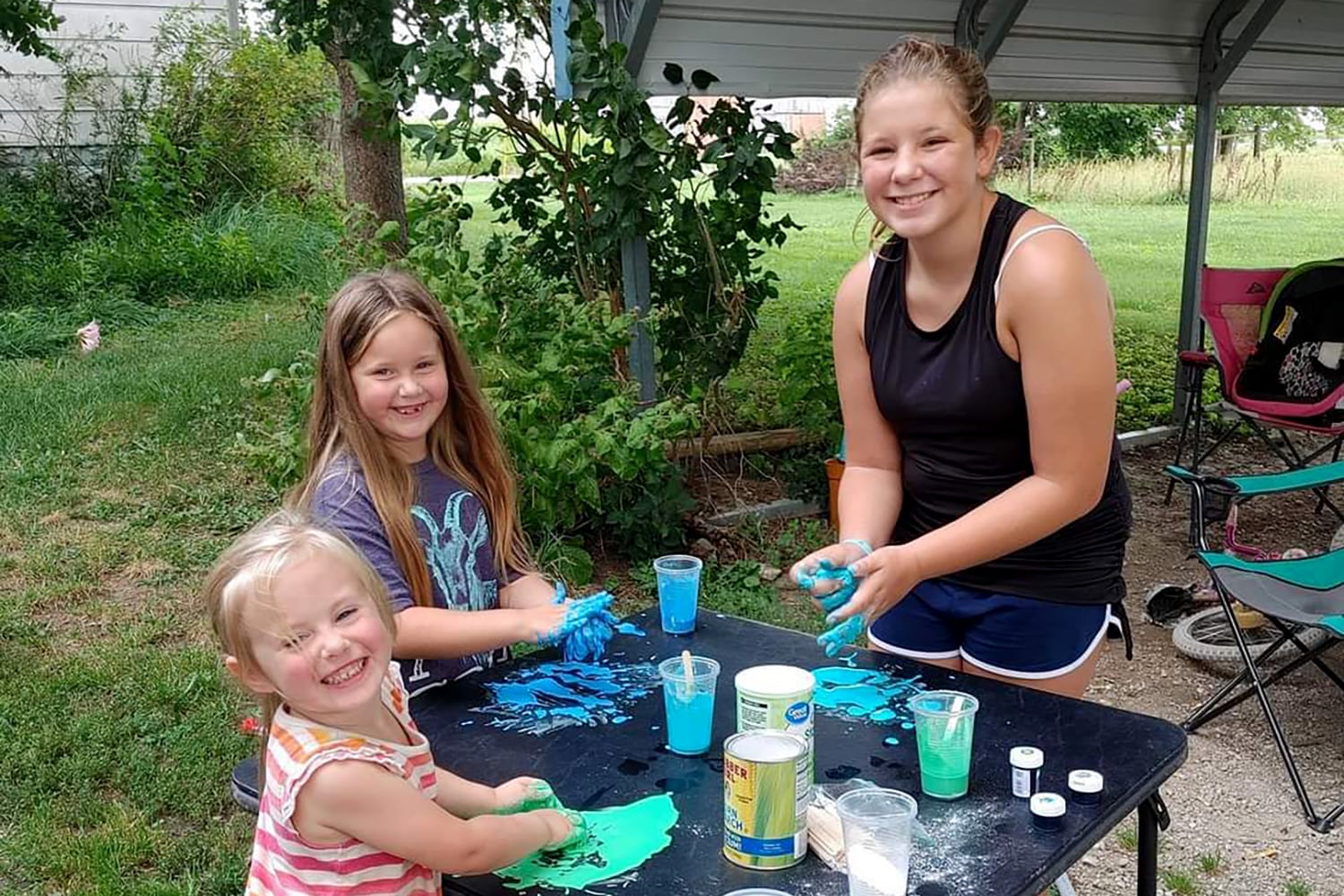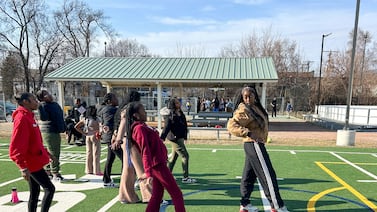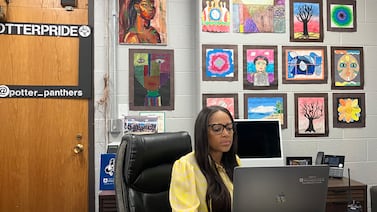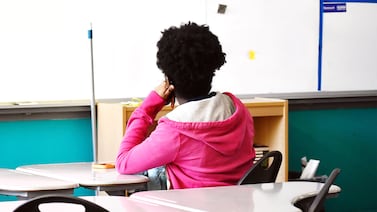Sign up for Chalkbeat Indiana’s free daily newsletter to keep up with Indianapolis Public Schools, Marion County’s township districts, and statewide education news.
Kori Simmons teaches her children at home, but doesn’t follow a curriculum. She doesn’t give many written tests or traditional homework. And she provides lots of educational flexibility for each child.
On Monday, the Shelbyville mom might focus on Native American culture. She’ll play her reed flute for the kids and help them make dream catchers.
Tuesday could bring chemistry and physics. The kids will mix cornstarch and water to create oobleck, a substance that behaves both like a liquid and a solid, to learn about non-Newtonian fluids. Wednesday might be flower-planting. Or papier-mâché. Or geysers made from a two-liter bottle of soda and a roll of Mentos.
Simmons, a former substitute teacher, plans to fully educate her younger daughters, ages 5 and 8, in this method. It’s called unschooling, a niche of home schooling that promotes child-led learning without the rules and structure of a traditional school environment.
“It’s really a play it by ear kind of thing, which sounds so crazy because we’ve all grown up in the public school system where everything is supposed to be planned out,” Simmons said. “We have to know who needs to do what, when, and life just isn’t that way.”
As state lawmakers look for ways to expand school choice and more families use options like vouchers for non-public schools, the unschooling movement offers an unconventional model made possible by the near-total freedom Indiana parents have over their children’s education. A Senate bill last session about school choice would have expanded home-schooling parents’ access to state funding for classes and educational services. But after some expressed concerns the proposal would also attach regulations to home schooling, lawmakers backed off.
Unschooling, which operates on a spectrum but legally isn’t distinct from homeschooling, goes untracked and largely unregulated. In fact, Indiana is one of 11 states that has both lax home schooling regulations and no requirement to report home schooling enrollment, according to the Homeschool Legal Defense Association.
State law requires home educators to provide instruction equivalent to that of public schools but doesn’t mandate specific courses or skills to be taught, and it leaves what’s equivalent open to interpretation. Plus, since the state doesn’t track home schooling or unschooling, Indiana has no way of enforcing the requirement for equivalent instruction.
That means Hoosier parents have almost universal freedom to design their unschooling, with some integrating curriculums with exploratory learning, and others allowing their children to completely direct their education.
Definitions of unschooling aren’t precisely nailed down. But generally, unschooling emphasizes less curriculum, learning through exploration and hands-on activities, and few if any academic requirements compared to traditional home schooling, according to practitioners and experts on home education who spoke with Chalkbeat.
It’s difficult to know how widespread the practice is because it’s not tracked by the state or federal government. An Indianapolis Facebook group for unschooling families has over 700 members, but the total number of parents in Indiana’s unschooling community is unclear.
Practitioners of unschooling say that a less-regimented form of education helps kids discover their passion for learning and follow their interests at an early age, which builds confidence and independence. However, critics say unschooling can result in an incomplete education, and the lack of oversight limits the ability to intervene in potentially abusive situations.
“What we know is that there are certainly families for whom and young people for whom home schooling and unschooling work very well,” said Robert Kunzman, professor of education at Indiana University and managing director of the International Center for Home Education Research. But there are also instances, he added, “where it is a cover for neglect or abuse, and it runs the gamut everywhere in between.”
Unschooling prioritizes child-led learning
Nationally, the number of families who home-school has skyrocketed since the pandemic, with an increase of 51% from 2017-18 to 2022-23 in states with comparable enrollment, according to a Washington Post analysis that collected data from 32 states. Indiana was one of 19 states without data available.
The analysis revealed that home schooling is now the nation’s fastest growing form of education.
Parents often choose to home-school because they are dissatisfied with the public education system or want to provide moral instruction, according to polling from before and after the pandemic began.
Similar data is not available for unschooling. However, Kunzman believes that many of the reasons for home-schooling would overlap with the reasons for unschooling — namely, the disillusionment with public schools and anti-establishment attitudes.
Unschooling takes those beliefs a step further and removes many traces of the public school classroom model, instead focusing on kids learning through experience and exploration. It’s a philosophy that gained traction in the 1970s and 1980s with the advocacy of public education critic John Holt.
Unschooling can vary from household to household, Kunzman added. While one family might purchase a curriculum for one subject and use child-led learning for other subjects, another family might rely entirely on the unschooled approach.
“Historically, unschooling emerged from a real dissatisfaction with institutions in general and highly structured, highly directed forms of education,” Kunzman said. “I think it appeals to parents and children who have a real resistance to externally dictated requirements.”
Simmons started home schooling and then unschooling during COVID. She was unhappy with how much remote learning resembled “busywork,” she said, and felt she could teach her children more effectively.
She began by relying mostly on curriculum, but switched to an unschooled approach when she noticed that book work was not engaging her kids.
“It was getting so monotonous for them,” Simmons said. “We were throwing in some hands-on things, and I realized they were learning so much more from discussion and from hands-on things.”
Kylene Varner, home educator and legislative liaison for Indiana Association of Home Educators, said her family mixes more structured home schooling with child-led learning. (She prefers the term child-led or delight-directed learning rather than unschooling.) She said she emphasizes history, world language, and literature, but encourages her children to go deeper when a topic appeals to them.
Her philosophy is that learning comes more easily when her children are passionate about the subject. When her daughter wanted to know more about jewelry making, Varner was excited to help her follow that curiosity, she said.
“Let’s go,” Varner said. “Let’s explore that. Why would I not take advantage of her having an interest in that?”
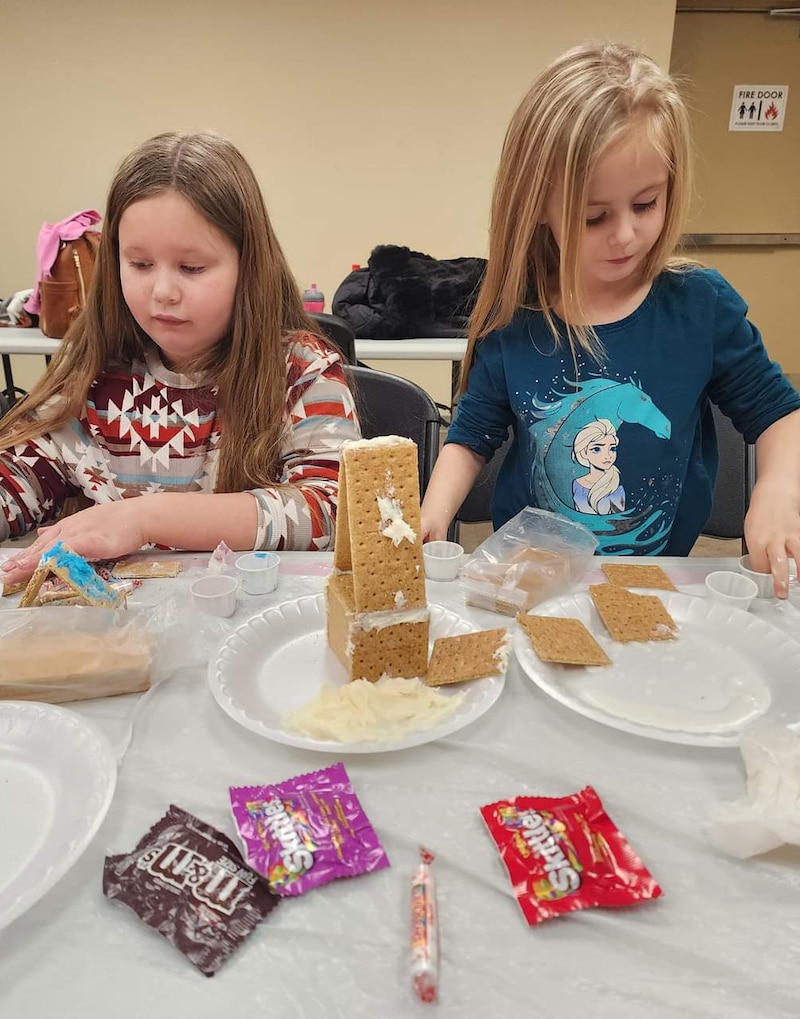
Simmons said in her unschooled method, she values not just an interest-led education, but a practical one. She created her own graduation requirements with benchmarks for English language arts and math, but also an emphasis on skills like hitching a trailer, cooking meals from scratch, public speaking, and growing vegetables.
If her children want to pursue higher level courses such as calculus, they’re welcome to. But if they’re not interested or don’t plan to attend college, she said, they don’t need that coursework.
“It is not an assumption that my children will go to college,” Simmons said. “It is an assumption that my children will be successful. Now, if success for them means that they work at McDonald’s, and they become a manager, then I’m okay with that as long as they are able to pay their own way, take care of their own family, have what they want, do what they want, and those sorts of things.”
Few home schooling, unschooling regulations exist in Indiana
When it comes to rules for approaches like home schooling and unschooling, Indiana is one of the most relaxed states in the country, said Christopher Lubienski, professor of education policy at Indiana University.
Under state law, parents can remove their elementary or middle school students from public school without reporting their intent to home-school to the district or the Indiana Department of Education. There are also no subject matter requirements for home education, unlike Ohio and Kentucky, which both mandate English language arts, history, mathematics, science, and government or civics.
“It’s largely unregulated,” Lubienski said. “It’s mostly defined by court rulings. The legislature simply hasn’t weighed in on these issues for the most part.”
The state legislature has heard only one bill in the last 10 years that would have increased the regulation of home schooling. Last year’s Senate Bill 255 would combine and expand existing state funding programs and allow Hoosier parents to apply for annual grants for a range of educational expenses, a boost for school choice in the state.
Home schooling families were eligible for funding in the first draft of the bill. But home education advocates expressed concern over the accompanying state oversight.
The bill’s author, Republican Sen. Ryan Mishler from Mishawaka, subsequently said the next draft of the bill, which legislators will consider in 2025, would exclude home-schoolers.
The exclusion of home-schoolers from state oversight fuels concerns about neglect and abuse, Lubienski said. The Coalition for Responsible Home Education, a nonprofit that advocates for state protections for home-schooled children, counted 191 fatalities since 2000 in its database of home schooling abuse and neglect cases.
In terms of concerns about educational neglect, Lubienski said, critics of home schooling and unschooling are skeptical that parents without special training are qualified to teach children.
“If you have parents who aren’t necessarily trained in how to educate a child that are doing this, is that child going to get the same preparation that a child in a regular school would?” he said.
The unschooling community rejects families who use the method to cover up abuse or neglect, Varner said, and those cases don’t represent the larger community. She added that any adult who witnesses child neglect or abuse is a state-mandated reporter.
Before recommending unschooling to a family, she would want to ensure the parents are prepared to provide a sufficient education, Varner said. She said gaps exist in any education model, but unschooling parents must internally hold each other accountable.
“That’s more of like a mentor-mentee relationship,” Varner said. “That’s not something that can be satisfied through legislation.”
Indiana’s lax home schooling regulations in Indiana don’t just impact parents and kids. Schools in Indiana can take advantage of the minimal oversight to pad their graduation rates by reporting high school dropouts as withdrawals to home schooling.
Unschoolers’ educational outcomes not clear
There is little empirical evidence to broadly support or discredit unschooling. Social scientists can’t control for variables like family background when it comes to the practice. And supporters as well as critics of unschooling often misrepresent what data is available to advance their preferred narrative, Kunzman and Lubienski said.
Organizations like the Home School Legal Defense Association have been highly influential in reducing regulations for home schooling across the country. Lubienski said these organizations claim home-schooled children score higher on exams, but the samples in the cited studies are not representative, and it’s difficult to conduct a controlled experiment on the issue.
“Kids who come from families with more educational resources, where parents are more invested in education, tend to do better in school whether they’re home-schooled or not,” he said.
In Indiana, if unschooling prevents children from receiving a quality education, that neglect would be largely hidden from view, Kunzman said. But, he believes the unschooling tenet of using the child’s interests as a starting point for deeper learning is not inherently a problem.
“When done well, I think that could be a really enriching form of education,” Kunzman said. “I think the risks are that it can also be not done well, and it can be a context where young people might not gain some vital skills and knowledge that they need.”
Haley Miller is a summer reporting intern covering education in the Indianapolis area. Contact Haley at hmiller@chalkbeat.org.

